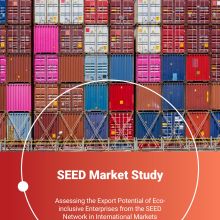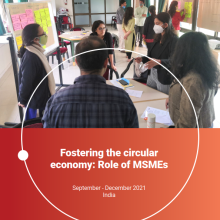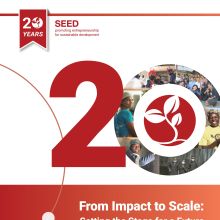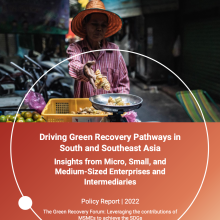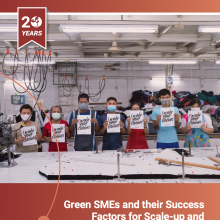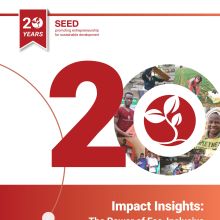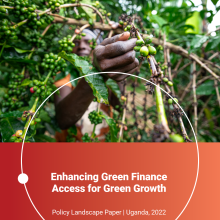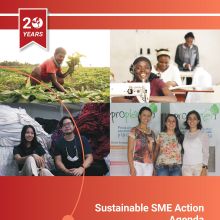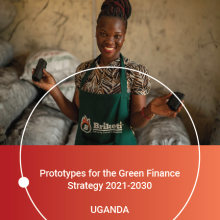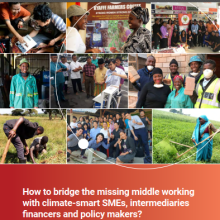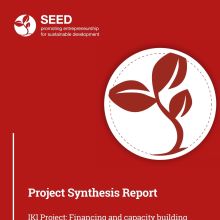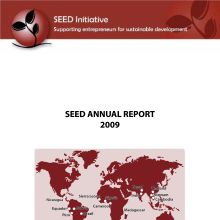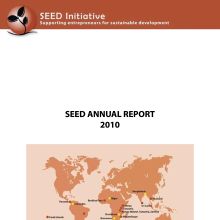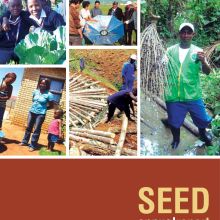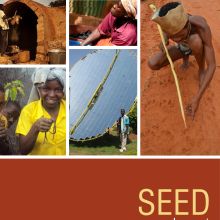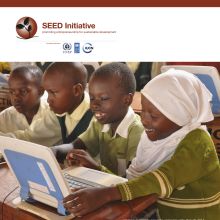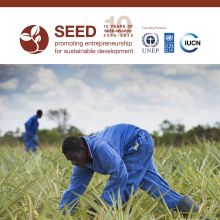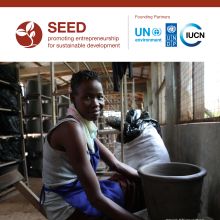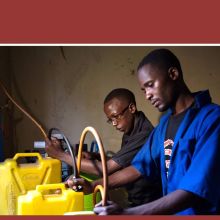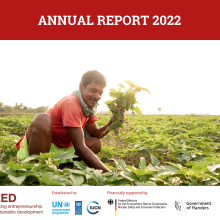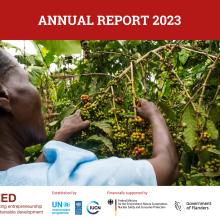- Manifested through the SDGs and the Paris Climate Agreement, the international community has agreed to tackle prevalent economic, environmental, and social challenges, whereby the private sector and businesses can make a pivotal contribution. This report analyses the international market potential of end-consumer products offered by enterprises from the SEED network from a supply and demand perspective, as well as identifying possible avenues for support.
- This policy brief looks at the role of MSMEs in catalysing the circular economy in India, and puts forward some recommendations and policy solution prototypes to support and unlock circular economy entrepreneurship. The recommendations and prototypes were developed as part of the SEED Practitioner Labs for Policy Prototyping in India, 2021.
- In honour of SEED’s 20th anniversary, this report aims to assess 2 decades of SEED’s work and takestock of what has been accomplished. Within 20 years, SEED has supported 2000 enterprises in 41 countries across 3 continents. These enterprises are the champions of the green transition. Working on the ground, they target the most severe impacts of climate change across 6 key sectors: biodiversity, green technologies, clean energy, sustainable agriculture, waste management and water, sanitation and health.
- The purpose of this Driving Green Recovery Pathways in South and Southeast Asia: Insights from Micro, Small, and Medium-Sized Enterprises and Intermediaries report is to showcase the importance of green and social MSMEs to drive Green Recovery and identify the supports that the intermediary and policy could provide. The insights in this report are derived from The Green Recovery Forum: Leveraging the contributions of MSMEs to achieve the Sustainable Development Goals.
- This report analyses small and medium-sized enterprises (hereby SMEs) with green business models and explores how selected enterprises scale and replicate their activities. Its main objective is to provide insights into the critical success factors for scaling and replication. It is intended for policymakers and intermediaries to draw direct insights from SMEs. It analyses the critical success factors for scale-up and replication of enterprise activities and highlights concrete recommendations to close existing gaps in order to maximise their contribution to the SDGs. Green SMEs can find inspiration through the case studies in the annex of this report. This report was prepared in collaboration with GO4SDGs.
- Celebrating SEED’s first 20 years and aware of the work that remains to be done, we take this opportunity to share valuable insights into the environment of eco-inclusive enterprises and the BDS ecosystem. Have a look at our 20 Year Impact Flagship Report: The Power of Eco-Inclusive Enterprises and BDS Providers.
- This policy landscape paper provides an overview of the state of green finance in Uganda, an overview of the relevant legal and regulatory frameworks, and highlights the challenges to accessing (by MSMEs) and delivering (by banks and finance institutions) green finance in Uganda.
To scale Green SME Support for 2030, SEED, GO4SDGs and UNEP jointly build on their collective experiences to formulate lessons learned and critical next steps to inform this Sustainable SME Action Agenda. Validated through a global consultation process involving key regional SME Stakeholder, this Action Agenda outlines critical next steps to empower the micro, small and medium-sized enterprises and build forward better.
- This policy brief highlights three prototypes developed as solutions to accelerate green finance flows in Uganda, and serve as inputs to the new Uganda Green Finance Strategy developed by the National Planning Authority.
The objective of this impact report is to gain consolidated impact insights and lessons learned from the International Climate Initiative (IKI) financed SEED project: Financing and capacity building for micro and small climate-smart enterprises: Filling the gap of the missing middle.
This report draws on the insights and action-oriented research from the SEED Practitioner Labs Climate Finance (PLCF) and the SEED Green Finance Academy (GFA) in the years 2019-2023. It also builds on the lessons from 20 years of experience of the SEED Programme supporting climate-smart SMEs along their scale-up and finance journeys.
This report summarises the results and outputs from the International Climate Initiative (IKI) financed SEED project: Financing and capacity building for micro and small climate-smart enterprises. Filling the gap of the missing middle from 2019-2024.
SEED 2009 Annual Report sets out our main activities and achievements for the period from May 2006 - December 2008.
The SEED Annual Report 2010 covers SEED’s progress and developments in 2010, as well as information on the SEED Award Winners and SEED Gold Winners from 2009: how SEED helps its winners to establish scale up; and tools developed by SEED for social and environmental entrepreneurs.
2011 was a remarkable year for SEED, where a record number of SEED winners were awarded.
In 2012, SEED has not only continued to work with a record number of inspiring and innovative grassroots social and environmental enterprises all over the world, but has also formed new partnerships and participated in major events which contributed to the promotion of both gender equality and the green economy.
Looking back, 2013 has been a particularly good year for SEED, a year marked particularly by the selection of the 34 new SEED Winners - remarkable exemplars of social and environmental entrepreneurs at the grassrootsand by growing interest internationally in the programme, but also by new partnerships to build on those that have been essential in SEED’s growth so far.
2014 was truly exceptional; a year where SEED recognised over forty new SEED Winners - remarkable enterprises that generate grassroots eco-solutions at the grassroots. This and more great SEED achievements in our annual report.
2015 was also a special year for SEED, in which the partnership celebrated 10 Years of SEED Awards, and took the opportunity to take stock and publish a comprehensive Flagship Report that looked not only on the success of former SEED Winners and the lessons learnt over those 10 Years of SEED Awards, but also on opportunities that could help increase the impact of locally-driven social and environmental entrepreneurship in the years to come. This and more you will find in the Anual Report
This Annual Report guides you through the innovative ways that SEED has advanced in 2016 to serve as an active thought leader in the realm of eco-inclusive entrepreneurship for sustainable development, while also introducing to you this year’s SEED Winners that are all individually driving sustainable development forward in their communities and in their countries.
Our annual visual report (A Year at SEED | 2018) celebrates achievements across both our Direct Enterprise Support and Ecosystem Building programmes plus shares our involvement in key high-level dialogues and milestones in organisational development, while introducing you to this year's SEED Low Carbon Award Winners who offer innovative solutions for climate change adaptation and mitigation.
2022 is a special year for SEED, not only celebrating 20 years but also drawing lessons from activities and various projects, initiating new collaborations while looking forward to 2023 and beyond, being better informed and equipped to contribute to urgent transformative change with and through SMEs. The 2022 Annual Report highlights SEED activities and achievements in terms of enterprise support, ecosystem building and advocacy.
In 2023, SEED has been hard at work supporting SMEs and promoting their crucial role in advancing sustainable and eco-friendly future, as well as fostering the transition to a circular economy. We are delighted to share some of our most meaningful achievements and activities, as we reflect on the passing year.

